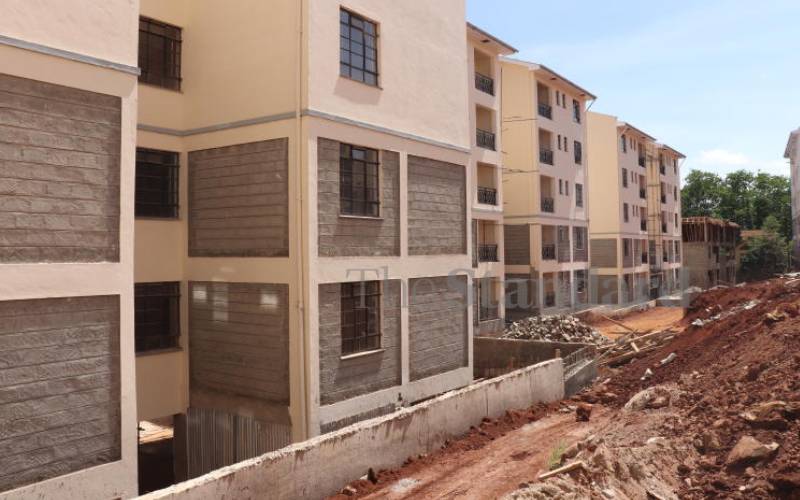
Poor record-keeping by the State Department of Housing and Urban Development is costing the government up to Sh651.1 million annually in revenue.
Details from the latest audit report for ministries, State departments and agencies show the annual rent collection for government houses has the potential to yield Sh1.5 billion every year.
This is about Sh127 million every month. But the government is only able to collect Sh873.4 million. The State Department is managing 56,892 houses for rent for the government.
The Auditor-General Nancy Gathungu, in her report covering the financial year 2020/21 notes that for the government houses occupied by the county government staff, deductions made through the respective payroll were not remitted to the State Department.
“Consequently, rent income due to the State Department was not collected in accordance with Regulation 43(c) of the Public Finance Management (National Government) Regulations, 2015 which requires an accounting officer to ensure that all appropriations, in-aid due to a national government entity are collected and properly accounted for in accordance with the relevant laws, rules and regulations,” reads the report.
The Auditor General notes in the report that the management of government houses and collection of rent is still largely manual as it is yet to be digitised.
“The benefits that accrue with digitisation such as the ability to establish an expectation on rental income from the individual ministries, departments, agencies or counties, invoicing, rent collections, booking of revenue, reconciliations and maintenance of houses have not been realised,” the report reads in part.
“These gaps in the manual system may lead to undetected loss of revenue,” it adds. The 56,892 houses are categorised into institutional, police and pool houses. They are further categorised into low, medium and high grades.
“However, the register maintained by the State Department did not contain key information such as the dates of occupancy and vacancy, occupants’ details and reason for non-occupancy,” the report says.
“Failure to maintain a comprehensive register makes it difficult to keep track of government houses and tenants in relation to occupancy, vacancy of the houses, houses with rent arrears and their respective maintenance costs.”

Taking responsibility
This, the report notes, is contrary to Regulation 139(1)(a) of the Public Finance Management (National Government) Regulations, 2015 which states that the accounting officer of a State entity should take full responsibility and ensure proper control systems exist for assets and that preventative mechanisms are in put place to eliminate theft, security threats, losses, wastage and misuse.
Just recently, the State Department issued a notice increasing rent for government housing by 10 per cent, attributing the rise to inflation.
This is the first-time rent has been increased in government houses in 20 years. The new rent charged was effective April 2022. Rent in government houses is fairly affordable and, on some occasions, even 50 per cent less compared to prevailing market rates.
As such, not only do civil servants fight to get accommodation but also the rest of the population who want to make some savings.
“It is important to note that there have been several reviews on house allowance for civil servants since 2001, but rent applicable to houses they occupy has remained largely the same over the said period,” said the Principal Secretary in charge of Housing Charles Hinga in a letter to his colleague Julius Muia at the National Treasury informing him of the proposed increase in rent.
“This review will still be below the market rate since the government residential houses are part of employer-assisted housing for civil servants,” he added.
The Auditor-General report shows that examination of records on boarded houses countrywide revealed that several houses were either encroached, condemned or demolished, transferred to other entities, or converted to offices for commercial use.
The State Department does not have an updated inventory of all houses countrywide which could be used to approximate the rent receivable from government houses.
In the absence of updated records, the extent of unrealised revenue from such boarded houses could not be confirmed,” says the report.
Additionally, the government has abandoned a Sh136.7 million housing project for the police at Emali Administration Police Training Camp which is 85 per cent complete.
“Management has not provided any evidence of efforts towards resumption of the works,” the report reads.
“Under the circumstances, it has not been possible to confirm whether value for money will be realised from the public funds committed to the project.”
 The Standard Group Plc is a multi-media organization with investments in media
platforms spanning newspaper print
operations, television, radio broadcasting, digital and online services. The
Standard Group is recognized as a
leading multi-media house in Kenya with a key influence in matters of national
and international interest.
The Standard Group Plc is a multi-media organization with investments in media
platforms spanning newspaper print
operations, television, radio broadcasting, digital and online services. The
Standard Group is recognized as a
leading multi-media house in Kenya with a key influence in matters of national
and international interest.

